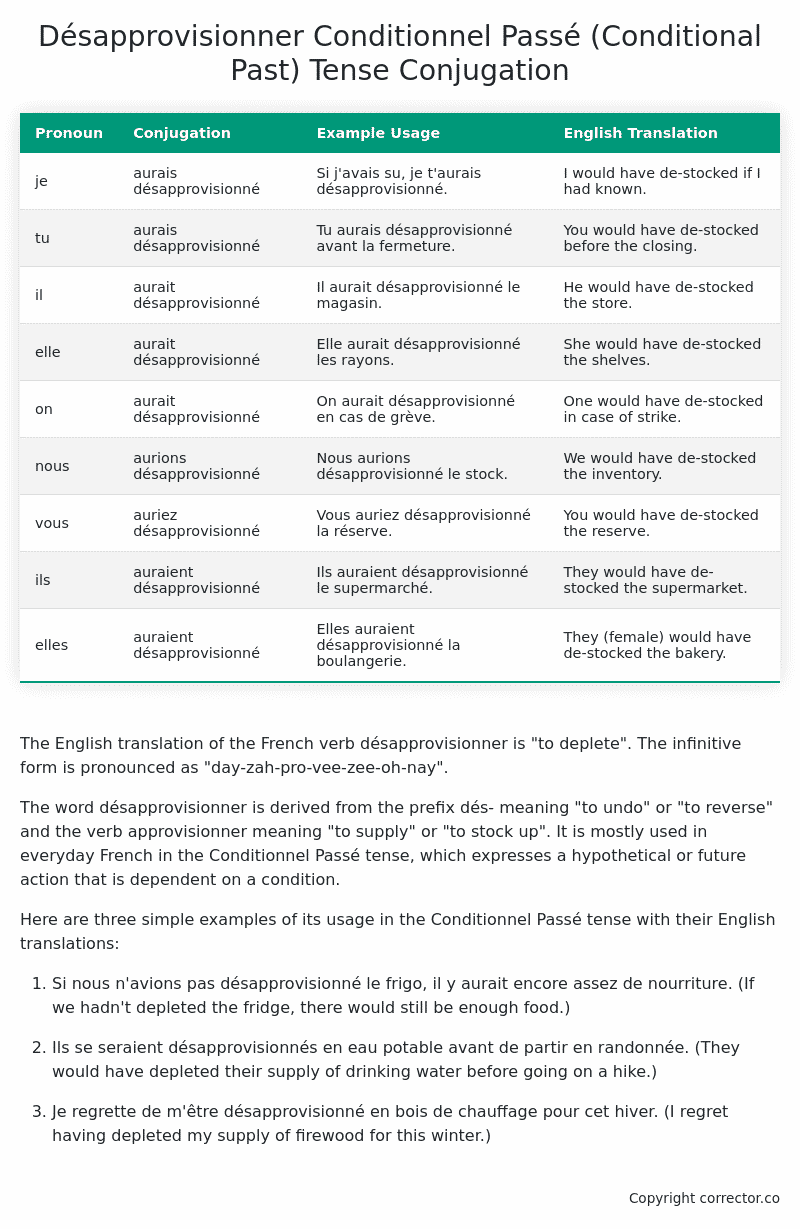Conditionnel Passé (Conditional Past) Tense Conjugation of the French Verb désapprovisionner
Introduction to the verb désapprovisionner
The English translation of the French verb désapprovisionner is “to deplete”. The infinitive form is pronounced as “day-zah-pro-vee-zee-oh-nay”.
The word désapprovisionner is derived from the prefix dés- meaning “to undo” or “to reverse” and the verb approvisionner meaning “to supply” or “to stock up”. It is mostly used in everyday French in the Conditionnel Passé tense, which expresses a hypothetical or future action that is dependent on a condition.
Here are three simple examples of its usage in the Conditionnel Passé tense with their English translations:
-
Si nous n’avions pas désapprovisionné le frigo, il y aurait encore assez de nourriture. (If we hadn’t depleted the fridge, there would still be enough food.)
-
Ils se seraient désapprovisionnés en eau potable avant de partir en randonnée. (They would have depleted their supply of drinking water before going on a hike.)
-
Je regrette de m’être désapprovisionné en bois de chauffage pour cet hiver. (I regret having depleted my supply of firewood for this winter.)
Table of the Conditionnel Passé (Conditional Past) Tense Conjugation of désapprovisionner
| Pronoun | Conjugation | Example Usage | English Translation |
|---|---|---|---|
| je | aurais désapprovisionné | Si j’avais su, je t’aurais désapprovisionné. | I would have de-stocked if I had known. |
| tu | aurais désapprovisionné | Tu aurais désapprovisionné avant la fermeture. | You would have de-stocked before the closing. |
| il | aurait désapprovisionné | Il aurait désapprovisionné le magasin. | He would have de-stocked the store. |
| elle | aurait désapprovisionné | Elle aurait désapprovisionné les rayons. | She would have de-stocked the shelves. |
| on | aurait désapprovisionné | On aurait désapprovisionné en cas de grève. | One would have de-stocked in case of strike. |
| nous | aurions désapprovisionné | Nous aurions désapprovisionné le stock. | We would have de-stocked the inventory. |
| vous | auriez désapprovisionné | Vous auriez désapprovisionné la réserve. | You would have de-stocked the reserve. |
| ils | auraient désapprovisionné | Ils auraient désapprovisionné le supermarché. | They would have de-stocked the supermarket. |
| elles | auraient désapprovisionné | Elles auraient désapprovisionné la boulangerie. | They (female) would have de-stocked the bakery. |
Other Conjugations for Désapprovisionner.
Le Present (Present Tense) Conjugation of the French Verb désapprovisionner
Imparfait (Imperfect) Tense Conjugation of the French Verb désapprovisionner
Passé Simple (Simple Past) Tense Conjugation of the French Verb désapprovisionner
Passé Composé (Present Perfect) Tense Conjugation of the French Verb désapprovisionner
Futur Simple (Simple Future) Tense Conjugation of the French Verb désapprovisionner
Futur Proche (Near Future) Tense Conjugation of the French Verb désapprovisionner
Plus-que-parfait (Pluperfect) Tense Conjugation of the French Verb désapprovisionner
Passé Antérieur (Past Anterior) Tense Conjugation of the French Verb désapprovisionner
Futur Antérieur (Future Anterior) Tense Conjugation of the French Verb désapprovisionner
Subjonctif Présent (Subjunctive Present) Tense Conjugation of the French Verb désapprovisionner
Subjonctif Passé (Subjunctive Past) Tense Conjugation of the French Verb désapprovisionner
Subjonctif Imparfait (Subjunctive Imperfect) Tense Conjugation of the French Verb désapprovisionner
Conditionnel Présent (Conditional Present) Tense Conjugation of the French Verb désapprovisionner
Conditionnel Passé (Conditional Past) Tense Conjugation of the French Verb désapprovisionner (this article)
L’impératif Présent (Imperative Present) Tense Conjugation of the French Verb désapprovisionner
L’infinitif Présent (Infinitive Present) Tense Conjugation of the French Verb désapprovisionner
Struggling with French verbs or the language in general? Why not use our free French Grammar Checker – no registration required!
Get a FREE Download Study Sheet of this Conjugation 🔥
Simply right click the image below, click “save image” and get your free reference for the désapprovisionner Conditionnel Passé tense conjugation!

Désapprovisionner – About the French Conditionnel Passé (Conditional Past) Tense
Formation
Common Everyday Usage Patterns
Expressing Unreal Past Scenarios
Polite Requests or Suggestions
Expressing Doubt or Uncertainty
Interactions with Other Tenses
Conditional Present
Indicative Past Tenses
Conditional Future
Summary
Want More?
I hope you enjoyed this article on the verb désapprovisionner. Still in a learning mood? Check out another TOTALLY random French verb conjugation!


